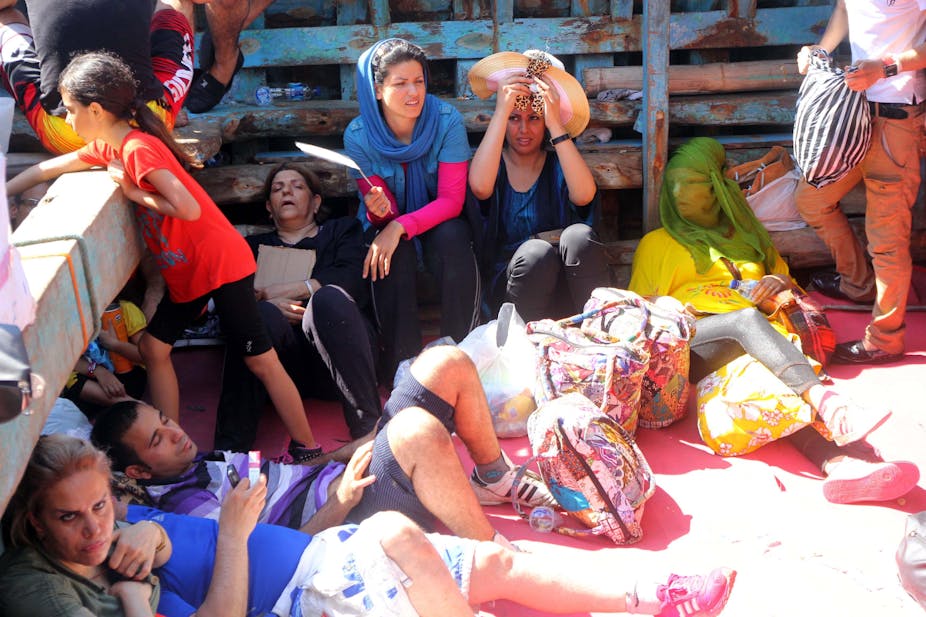Seventy asylum seekers have been moved from the Manus Island immigration detention facility to Christmas Island following a long overdue decision by the Gillard government. The decision to keep families in the temporary facilities, where about 300 asylum seekers remain, has finally been overturned.
Many critics have raised concerns about the health risks, particularly to children, of being held at the centre. An ABC Four Corners program in April graphically illustrated the concern and called for the government to take action.
Yet at the time, immigration minister Brendan O’Connor dismissed the health and other concerns. O'Connor preferred to focus on the issue of deterrence. He said:
I haven’t been contemplating a change to the composition of those on Manus province, because we made a decision, a difficult decision, to ensure that we deter people getting on very unseaworthy vessels.
The health profiles and prospects of immigrants, refugees and asylum seekers are very different. The differences among the groups are the product of multiple mainly social determinants. Immigration, social welfare and health policies are among the most important.
Although health profiles vary significantly by birthplace, immigrants are generally healthier than Australian-born individuals. They have substantially lower all-cause mortality than the Australian-born; lower rates of hospitalisation for most diseases and generally lower suicide rates - although these vary greatly by country of birth.
However, the longer immigrants reside in Australia the more closely their health status aligns to that of the Australian-born, with gradual loss of the initial health advantage. The rate of mental disorders in immigrants is generally similar to the rate in the Australian-born population.
The most important reason for these long-standing differences in the health profiles of immigrants and the Australian-born is immigration policy, which specifically selects people with good health. This selection process results in what is known as the “healthy migrant” effect. Refugee health is subject to a very different pattern of social determinants and the health profile of refugees is significantly different to those of immigrants and the Australian-born.
Experiences of trauma and torture have long-lasting physical and mental health impacts. Physical injuries, often dangerous flight, long periods in poorly resourced refugees camps and widely different experiences of the journey to and settlement in Australia are all important elements. Access to skilled and effective health services in Australia, particularly mental health treatment and care, is limited by unavailability of appropriate and skilled services and by language and cultural impediments to access.
The major health concern for refugees is mental disorders. Rates of depression, anxiety and traumatic stress syndromes, and risk of developing a psychotic disorder, such as schizophrenia, are substantially higher than those among the Australian-born. Highly developed professional skills are required to provide effective treatment and care. Despite these challenges, the health and settlement services available to refugees in Australia are among the best in the world.
For example, Victorian health minister David Davis recently announced a A$22.2 million increase in state funding for refugee health services in response to the rapidly growing numbers of refugees and asylum seekers coming to Victoria. He said:
It is in our interests as well as their [refugees and asylum seekers] interests that we get their health right from the start.
Australia’s response to the health and social needs of refugees shows what we are capable of. But what then of the health of asylum seekers?
Asylum seekers share the same factors impacting on their health status as refugees, except that those who arrive by boat are subject to detention and other harsh aspects of asylum seeker policy, such as denial of work rights. The positive Commonwealth and state/territory arrangements for refugees do not apply to asylum seekers arriving by boat.
The limited research that has been done - and multiple inquiries by the Australian Human Rights Commission, the Commonwealth Ombudsman, Amnesty International among others - show that the major health issue for asylum seekers is the damage done to their mental health by immigration detention and related aspects of asylum seeker policy. This damage is knowingly and systematically done to asylum seekers in pursuit of the fanciful policy objective of deterrence.
Even if one accepts “Pacific Solution 2” as a reasonable response to the growth in the number of boat arrivals, the damage is also the product of the failure to put in place agreed safeguards. The negative health and settlement consequences for asylum seekers will be long-term and the costs to the community - in terms of continuing need for health services and prolonged disability - will be substantial. Unlike our response to refugees, our response to boat arrivals is not an illustration of Australia at its best.
The United Nations High Commissioner for Refugees’ regional representative Rick Towle has previously said that Australia’s current humanitarian challenge of boat arrivals needs a “principled and humanitarian response in line with Australia’s proud record of assisting those in need”. He noted that there has been:
A sharp deterioration in the quality of protection for asylum seekers and refugees coming by boat and a worrying erosion of public support for asylum in Australia.
The next step in this long-running and toxic political drama is the intended visit by prime minister Julia Gillard to Indonesia to discuss with Indonesian president Susilo Bambang Yudhoyono ways to stem the rising flow of asylum seekers coming by boat.
The general consensus is that regional engagement and a collaborative effort is essential to effectively handle the global refugee crisis.
However, while Australia applies more restrictive and directly harmful policies based on simplistic attempts at deterrence, the prospects for such an agreement are increasingly remote. A more principled and ethical response to the plight of asylum seekers by Australia would contribute to achieving the goal of regional cooperation.

